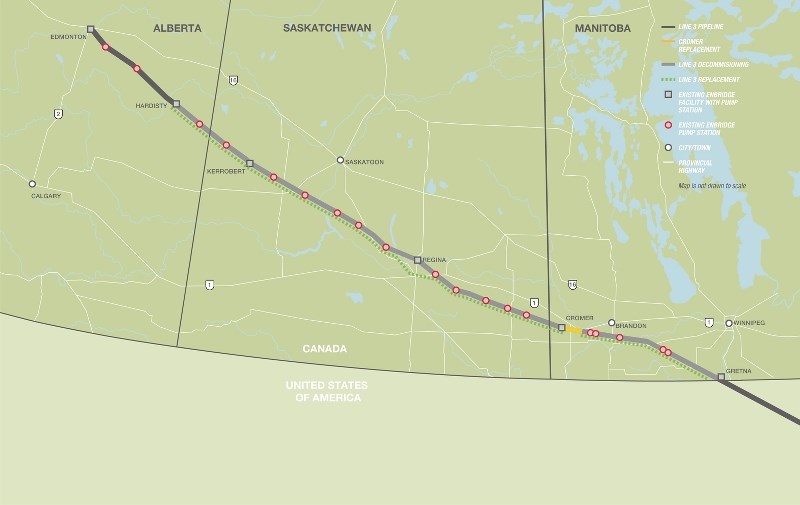There is a “glimmer of hope” on the horizon for the City of Cold Lake, after the federal government announced the approval of two pipeline projects, creating jobs within the province of Alberta and beyond.
On Tuesday, Nov. 29, the Government of Canada signed off on Kinder Morgan's Trans Mountain Expansion project, subject to 157 binding conditions, and Enbridge's Line 3 Replacement Project, subject to 37 conditions that will address potential Indigenous, socioeconomic and environmental impacts the projects may have moving forward.
Bonnyville-Cold Lake MLA Scott Cyr said the approval of these projects means oil will be moving out of the Cold Lake area.
“We needed to increase the capacity out of the province, and this will do that,” he said, adding one barrier may be the emissions cap recently implemented by the Alberta Government.
“That potentially is going to limit the ability to pull oil out of the ground, so this does have some unfortunate side effects, but our riding needed this pipeline to go forward. They are not new… but you know what, let's take our wins when we get them,” he added.
City of Cold Lake Mayor Craig Copeland wasn't surprised by the Prime Minister's decision, and is happy to see at least two projects moving forward.
“I think for our area, we have a lot of people who are out of work and are hanging by a thread, and we have businesses that are down a lot, so maybe this is a glimmer of hope.”
Copeland added, “We are hopeful that maybe some jobs will return to our area, and maybe our economy will start to pick-up again.”
One concern the mayor has is the abundance of environmental groups and other organizations causing a great “amount of noise” regarding the Trans Mountain pipeline.
“I expect there will be a lot of nonsense going on to try and prevent Trans Mountain from building that pipeline,” he said, adding the project may not be able to break through the barrier of politics and various groups attempting to stop the project.
The Trans Mountain Pipeline was built in 1953, and on Dec. 16, 2013, the organization filed a facilities application for the expansion of its already existing 1,150-kilometre pipeline spanning from Strathcona County, AB to Burnaby, BC.
The expansion will cost approximately $6.8 billion, and will include the addition of 980-kilometres of new pipeline. It will also see the reactivation of 193-kilometres of pipeline, the construction of 12 new pump stations, and the addition of 20 new tanks to be added to existing storage terminals in Burnaby, BC, Sumas, BC, and Edmonton, AB.
The old pipeline will be used to transport refined products, such as synthetic crude oils and light crude oils, with the capability for heavier crude oils. The new line would carry heavier oils, but would also have the potential of carrying lighter crude oils.
Construction for the Trans Mountain could happen as early as next fall.
“That is going to create jobs in our country, which we desperately need,” Copeland said, adding the project he believes will have the biggest impact on the Lakeland is the Line 3 Replacement Project.
The Line 3 Project involves the replacement of 1,660-kilometres of existing pipeline from Hardisty, AB to Gretna, MB using modern pipe materials and construction methods.
The project is expected to cost $4.8 billion, and will generate over $514 million in revenues for the federal and provincial governments. Projections estimate over 7,000 new jobs will be created during the construction period.
The Line 3 pipeline could be in service as early as 2019.
“I am glad that Line 3 and Trans Mountain were approved, but simply approving pipelines is not enough,” said Fort McMurray-Cold Lake MP David Yurdiga. “I am skeptical that when public pressure mounts, Prime Minister Justin Trudeau will stand up for the energy industry.”
Provincial Wildrose leader Brian Jean said the approval of the two projects is “nothing but good news for Alberta.”
“Pipelines in all directions create jobs and improve the long-term prosperity of our province,” he said. “However, we need pipelines built, not just approved.”
Premier Rachel Notley was also pleased with the announcement, saying in a statement, “Our province has been brutally slammed by the collapse in commodity prices… It's been a long dark night for the people of Alberta as a result. Today we are finally seeing some morning light.”
In addition to the approvals, the federal government announced an embargo on crude and persistent oil tankers along BC's north coast, and directed the National Energy Board to dismiss the Northern Gateway Pipelines Project application.
Cyr said he was disappointed by the decision to decline the Northern Gateway Pipeline.
“This was a fully approved pipeline and to hear that the Prime Minister had rejected the pipeline is very distressing. We need to have oil going in all directions, and we need new pipelines.”
“What's really unfortunate about the Gateway project is that in this one, there were a lot of Aboriginal and Métis businesses and communities tied into it financially. I feel sorry for the Aboriginal communities that were looking into this as a business venture,” added Copeland. “This is kind of the story that is not being told.”
The organization is known as the Aboriginal Equity Partners (AEP), and consists of 31 First Nations and Métis communities who support the Northern Gateway Pipelines Project.
“While there are Indigenous groups and environmental activists celebrating this decision, there are 31 Indigenous communities that had signed on as equity partners to the doomed project that would have seen a projected $2 billion in economic activity,” said Yurdiga. “Northern Gateway would have also brought 4,000 much need jobs to the region.”
In making the decision, the federal government stated that they took the Joint Review Panel report into consideration, as well as the decision of the Federal Court of Appeal.



